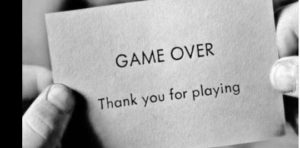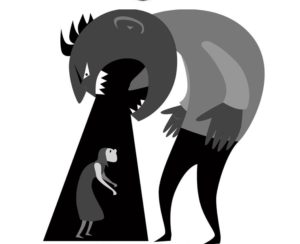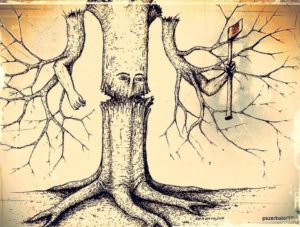Last week, we began the first of a two-part series delving into learned behaviors and coping mechanisms when one is or has been involved with a narcissist or in an abusive relationship. If you’d like a refresher, you can re-read Part 1. Otherwise, let’s jump back in and pick up where we left off.
6. You’ve become introverted and isolated. The narcissist is so remarkably adept at breaking down the bonds you have formed with other people that you don’t realize you are, in fact, distancing and alienating those who truly care for you. Your friends initially see it as you simply wanting to spend all of your time with your new  love interest. After all, the relationship is new, fresh and alive. And this person is exciting and titillating! It’s only natural to want to take in every moment with them that you possibly can. However, in doing so, you are fostering the construction of an ever-expanding chasm that has developed unnoticed betwixt you and your close friends, whilst simultaneously honing your commitment to the narcissist to a razor fine blade that, at some juncture, will serve to sever as many close ties with as many friends and loved ones as possible at the hands of the narcissist.
love interest. After all, the relationship is new, fresh and alive. And this person is exciting and titillating! It’s only natural to want to take in every moment with them that you possibly can. However, in doing so, you are fostering the construction of an ever-expanding chasm that has developed unnoticed betwixt you and your close friends, whilst simultaneously honing your commitment to the narcissist to a razor fine blade that, at some juncture, will serve to sever as many close ties with as many friends and loved ones as possible at the hands of the narcissist.
Think back to the dynamic of your relationship with your narcissist. Your narcissist did little-to-nothing to nurture healthy relationships between you and the positive people in your life, did they? My narcissist, Julia, tried desperately to come between my, at the time, nine-year-old son and me. At every turn, she offered “kind and gentle words of wisdom” about how I was letting him run my life when, in fact, I was allowing her to ruin my life by surreptitiously isolating me from the people I value and cherish the most. And any expression of defiance or rebuttal on my part was met with her exaggerated reaction to the point that I found myself apologizing for, in essence, being a loving and devoted father.
I recall one evening Julia came to see me and decided to stay the night. However, my son was upset and couldn’t sleep. Julia said it was okay if he needed to sleep with me, she’d just go home. “It’s no big deal. I’ll understand.” But something told me it was indeed a big deal and I’d pay the price, later. Sure enough, she left that night acting as though everything was fine between us. But then she texted me the next morning, saying, “You showed me who truly mattered to you last night and it  wasn’t me.” She then childishly gave me the silent treatment for the next two months, ignoring all of my phone calls, texts, and e-Mails trying to make peace with her and between us – yet another in the seemingly incessant string of discard phases.
wasn’t me.” She then childishly gave me the silent treatment for the next two months, ignoring all of my phone calls, texts, and e-Mails trying to make peace with her and between us – yet another in the seemingly incessant string of discard phases.
7. Romanticizing past abuse. After some time apart (the discard phase), it is not uncommon to finally hear from the narcissist. S/He will tell you how much they love and miss you and, for a short while, the narcissist will actually engage in very loving and nurturing behavior refreshingly similar to how they acted when you first met (the love bombing phase); however, since they are now trying to “suck” you back in, this stage is termed the hoovering phase.
The narcissist is so unbelievably adept at twisting and warping the moment, and your perception of what is being shared in that moment, that you very quickly begin  to forget all of the previous affronts, those atrocities s/he perpetrated against you. In very short order you find yourself thinking, “At last! They get it! S/He realizes what we have (had) and s/he’s finally willing to do what it takes to make it work!” The narcissist will most likely, at some point, even agree to go to counseling together. My narcissist did. And after just two sessions, she very kindly told me, “Sweetheart, I don’t feel he’s helping us. Perhaps you should continue to go so you can address your childhood trauma.” Do you see how, once again, the narcissist turns things around to where you are the one who needs help? You are the one who is broken? How, because of you, the relationship is broken and failing?
to forget all of the previous affronts, those atrocities s/he perpetrated against you. In very short order you find yourself thinking, “At last! They get it! S/He realizes what we have (had) and s/he’s finally willing to do what it takes to make it work!” The narcissist will most likely, at some point, even agree to go to counseling together. My narcissist did. And after just two sessions, she very kindly told me, “Sweetheart, I don’t feel he’s helping us. Perhaps you should continue to go so you can address your childhood trauma.” Do you see how, once again, the narcissist turns things around to where you are the one who needs help? You are the one who is broken? How, because of you, the relationship is broken and failing?
While it’s true we are all a little broken, some of us more so than others, there are few people who are as genuinely and irreparably broken as the narcissist and, on some level, they know this. This is the core reason they refuse to seek legitimate, professional help. It is much easier for them to live in their self-serving state of denial than to finally admit to their heightened state of brokenness thus embracing the undeniable fact that they are less than the idealized sense of perfect  they falsely believe themselves to be. Instead, they project all of their brokenness, internal discord, and emotional disconnect onto their empath, you, which is why, at some point, they will throw you away, (the discard phase) – the narcissist can’t stand seeing their own hideousness reflected back at them through you.
they falsely believe themselves to be. Instead, they project all of their brokenness, internal discord, and emotional disconnect onto their empath, you, which is why, at some point, they will throw you away, (the discard phase) – the narcissist can’t stand seeing their own hideousness reflected back at them through you.
It is imperative when the narcissist executes the discard phase, you absolutely must sit down and write out all the feelings of pain, anguish, and betrayal you are struggling with and attempting to process. For it’s here, when your feelings are raw and the wounds are fresh, that you are more likely to be honest with yourself about how you’ve been treated and about how you feel toward your narcissist. Otherwise, waiting until later, especially weeks or even months later to record your feelings, only invites your selective memory to effectively cafeteria-pick the few good times you remember with your narcissist, romanticizing them to the point that they very quickly and conveniently eclipse all of the bad that transpired betwixt you and your abuser and you once again find yourself missing your abuser and the seductively destructive time together. Or, more accurately, you find yourself missing those very few pleasant instances with the narcissist whilst selectively forgetting the vast majority of painful moments that were the price of paying the piper for the dance.
feelings are raw and the wounds are fresh, that you are more likely to be honest with yourself about how you’ve been treated and about how you feel toward your narcissist. Otherwise, waiting until later, especially weeks or even months later to record your feelings, only invites your selective memory to effectively cafeteria-pick the few good times you remember with your narcissist, romanticizing them to the point that they very quickly and conveniently eclipse all of the bad that transpired betwixt you and your abuser and you once again find yourself missing your abuser and the seductively destructive time together. Or, more accurately, you find yourself missing those very few pleasant instances with the narcissist whilst selectively forgetting the vast majority of painful moments that were the price of paying the piper for the dance.
8. Defending the guilty. Part of the abuse process, as was alluded to in Point 1 (of Part 1), is an absolutely abysmal tool the narcissist uses with surgeon-like skill called trauma-bonding. This is a punishment/reward system, a destructive dichotomy of abusively bonding you to the narcissist, eerily akin to Stockholm Syndrome wherein  you have someone in a position of power (the narcissist) who is emotionally and psychologically holding someone hostage (you). Believe it or not, you, the abused, will more often than not choose to stay with your abuser, even willingly returning if you ever decided to leave in the first place. Being involved with a narcissist is akin to traversing a minefield that, through trial-and-error, we have learned to somewhat deftly navigate. When in public, through all external appearances, we (the narcissist and us) can appear to be quite happy and in love. It’s not uncommon to hear people commenting on what an amazing couple you are and how they can tell yours is a love that will last a lifetime. However, when you and the narcissist are behind closed doors, it’s a polar opposite dynamic that takes place, almost a Jekyll and Hyde transformation from the façade of the loving person they were earlier in public, to the person they truly are in private.
you have someone in a position of power (the narcissist) who is emotionally and psychologically holding someone hostage (you). Believe it or not, you, the abused, will more often than not choose to stay with your abuser, even willingly returning if you ever decided to leave in the first place. Being involved with a narcissist is akin to traversing a minefield that, through trial-and-error, we have learned to somewhat deftly navigate. When in public, through all external appearances, we (the narcissist and us) can appear to be quite happy and in love. It’s not uncommon to hear people commenting on what an amazing couple you are and how they can tell yours is a love that will last a lifetime. However, when you and the narcissist are behind closed doors, it’s a polar opposite dynamic that takes place, almost a Jekyll and Hyde transformation from the façade of the loving person they were earlier in public, to the person they truly are in private.
It’s here, where we as the abused bear witness to this prolific paradigm shift that we once again, as stated in Point 3 (Part 1), continue to doubt our own perception and interpretations of reality. One minute, in public, the narcissist is loving, kind, caring, charismatic, compassionate, even affectionate and playful! The next, in private, they are cold, calloused, unfeeling, calculating and cruel. You’re left completely befuddled and perplexed as to what just happened. And when you ask the narcissist about this sudden shift, you’re told you’re imagining things, you’re  being too sensitive, or that you’re just making things up. “That never happened!” It is for this reason, many times, that a victim of abuse will refrain from coming forward and making public what continues to transpire in private. This vehement denial of well-established events, and the subsequent repercussions where you believe you are “losing it,” going crazy, or are somehow becoming unhinged, is what’s known as gaslighting – a reprehensible method of manipulation where the abuser systematically breaks apart and down the abused’s own observations to the point that they no longer trust themselves to intelligently or factually interpret any series of events of which they were involved.
being too sensitive, or that you’re just making things up. “That never happened!” It is for this reason, many times, that a victim of abuse will refrain from coming forward and making public what continues to transpire in private. This vehement denial of well-established events, and the subsequent repercussions where you believe you are “losing it,” going crazy, or are somehow becoming unhinged, is what’s known as gaslighting – a reprehensible method of manipulation where the abuser systematically breaks apart and down the abused’s own observations to the point that they no longer trust themselves to intelligently or factually interpret any series of events of which they were involved.
People, especially close friends, will begin to notice the subtle changes in the way your partner treats you and how you re/act around him or her. They will try to warn you. However, true to the narcissist/empath, enabled/enabler paradigm, you will defend the narcissist and their actions because the narcissist has very skillfully trauma bonded you to them. “But s/he loves me!” Or, “You don’t know what you’re talking about. S/He treats me so well…most of the time.” What you must keep at the forefront of your mind is the abuser never once made any effort to protect or care for you, not genuinely. Their warped sense of love and commitment is a self-placating system of servitude developed for no other purpose than to feed  their fragile and twisted ego through your endless emotional, physical, and sexual sacrifices, lest reality come crashing in and annihilate their microcosm wherein they reign supreme. As enablers, we have unwittingly assisted in creating and bolstering their illusion of superiority and entitlement. Remember; they never once truly protected you from anyone, especially themselves.
their fragile and twisted ego through your endless emotional, physical, and sexual sacrifices, lest reality come crashing in and annihilate their microcosm wherein they reign supreme. As enablers, we have unwittingly assisted in creating and bolstering their illusion of superiority and entitlement. Remember; they never once truly protected you from anyone, especially themselves.
9. Being unable to set and adhere to healthy boundaries. Failing to establish and stick to healthy boundaries sets the theater for the abuser to come in and begin the cycle of abuse that establishes their position of dominance and power in the relationship. It’s a sad truth that the one with the most power in any relationship is generally the one who is least invested. By our failure to establish  healthy, reasonable boundaries that firmly, yet lovingly, let the other person know we will not tolerate being treated in a disrespectful or demeaning manner, our temperament for accepting unacceptable treatment becomes fluid and dynamic. In essence, we have trouble saying, “No,” and no one listens when we do. By allowing mistreatment once, we invite one occurrence to become common and accepted practice. We find ourselves agreeing to things we wouldn’t normally agree to or would otherwise find unpalatable and objectionable. You must remember, above all else, that you are a person who is deserving of being treated with love, kindness, and respect by your partner. Even in those moments when you might not feel deserving, you are deserving!
healthy, reasonable boundaries that firmly, yet lovingly, let the other person know we will not tolerate being treated in a disrespectful or demeaning manner, our temperament for accepting unacceptable treatment becomes fluid and dynamic. In essence, we have trouble saying, “No,” and no one listens when we do. By allowing mistreatment once, we invite one occurrence to become common and accepted practice. We find ourselves agreeing to things we wouldn’t normally agree to or would otherwise find unpalatable and objectionable. You must remember, above all else, that you are a person who is deserving of being treated with love, kindness, and respect by your partner. Even in those moments when you might not feel deserving, you are deserving!
As recommended in Point 5 (Part 1) it would be advisable to create a list of boundaries, must-have’s and can’t-stands, to hold your future partner accountable to, or anyone else in any current or future relationship, and review that list periodically to ensure that you are holding your partner answerable for respecting you and those  established boundaries and that they are, in fact, adhering to your reasonable expectations. This is not to be confused with being inflexible or intolerant of another person or their shortcomings. If, for example, you discover your partner has been dishonest with you, confront them and do not accept a transparent excuse as justification for their deception. Or, perhaps, you discover they have been unfaithful to you, either physically or with eyes and a heart that wander, do not tolerate such blatant disrespect. You are better than this. You deserve better than this.
established boundaries and that they are, in fact, adhering to your reasonable expectations. This is not to be confused with being inflexible or intolerant of another person or their shortcomings. If, for example, you discover your partner has been dishonest with you, confront them and do not accept a transparent excuse as justification for their deception. Or, perhaps, you discover they have been unfaithful to you, either physically or with eyes and a heart that wander, do not tolerate such blatant disrespect. You are better than this. You deserve better than this.
In closing, having been involved with a narcissist is probably one of the most destructive, devastating, demoralizing, and demeaning experiences to which a person can be subjected. The wreckage and ruin from the fallout of a broken person’s broken love is nothing short of soul-crushing, setting the stage for continued and repeated sold-out performances of future cacophonous symphonies of narcissistic abuse. The healing process is a very long and trying journey wrought with trial-and-error, sometimes backsliding, even falling down and feeling exasperated and exhausted to the point that you feel as though giving up is the only option. When you feel like giving up, and you will, when you feel like admitting  defeat and letting the wolves have their way with your bones, remember how far you’ve come on your journey to healing. Your narcissist was unable to destroy you. Don’t finish the job for them by becoming your own destruction.
defeat and letting the wolves have their way with your bones, remember how far you’ve come on your journey to healing. Your narcissist was unable to destroy you. Don’t finish the job for them by becoming your own destruction.


Feel free to comment below! ?